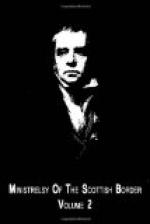He set his back unto an aik,
He set his feet against a
stane,
An’ he has fought these fifteen
men,
An’ kill’d them
a’ but barely ane;
For he has left that aged knight,
An’ a’ to carry
the tidings hame.
When he gaed to his lady fair,
I wat he kiss’d her
tenderlie;
“Thou art mine ain love, I have
thee bought;
“Now we shall walk the
green-wood free.”
[Footnote A: Weird her in a great sin—Placed her in danger of committing a great sin.]
[Footnote B: Gin—The slight or trick necessary to open the door, from engine.]
[Footnote C: Wane—A number of people.]
THE TWA CORBIES.
This poem was communicated to me by Charles Kirkpatrick Sharpe, Esq. jun. of Hoddom, as written down, from tradition, by a lady. It is a singular circumstance, that it should coincide so very nearly with the ancient dirge, called The Three Ravens, published by Mr Ritson, in his Ancient Songs; and that, at the same time, there should exist such a difference, as to make the one appear rather a counterpart than copy of the other. In order to enable the curious reader to contrast these two singular poems, and to form a judgment which may be the original, I take the liberty of copying the English ballad from Mr Ritson’s Collection, omitting only the burden and repetition of the first line. The learned editor states it to be given "From Ravencroft’s Metismata. Musical phansies, fitting the cittie and country, humours to 3, 4, and 5 voyces, London, 1611, 4to. It will be obvious (continues Mr Ritson) that this ballad is much older, not only than the date of the book, but most of the other pieces contained in it.” The music is given with the words, and is adapted to four voices:
There were three rauens sat on a tre,
They were as blacke as they might be:
The one of them said to his mate,
“Where shall we our breakfast take?”
“Downe in yonder greene field,
“There lies a knight slain under
his shield;
“His hounds they lie downe at his
feete,
“So well they their master keepe;
“His haukes they flie so eagerly,
“There’s no fowle dare come
him nie.
“Down there comes a fallow doe,
“As great with yong as she might
goe,
“She lift up his bloudy hed,
“And kist his wounds that were so
red.
“She got him up upon her backe,
“And carried him to earthen lake.
“She buried him before the prime,
“She was dead her selfe ere euen
song time.
“God send euery gentleman,
“Such haukes, such houndes, and
such a leman.
Ancient Songs,
1792, p. 155.
I have seen a copy of this dirge much modernized.




